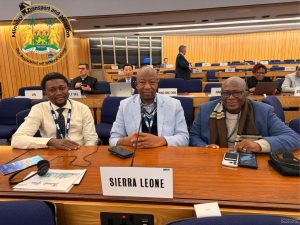The Tony Elumelu Foundation’s Impact on Young African Entrepreneurs

I am a proud Nigerian and a proud African. As a philanthropist and entrepreneur, I have seen firsthand that to effectively tackle climate change within the African context—from Egypt to Nigeria to South Africa—we must focus on the people it impacts the most. Climate change is not just an environmental issue; it’s a socio-economic challenge that affects livelihoods, security, and overall well-being.
Too often, businesses on our continent have fallen short in creating lasting value. Instead of fostering long-term investments, many have prioritized short-term profits from commodity trading. This mindset not only undermines economic stability but also hampers our ability to address pressing issues such as climate change. To combat these challenges sustainably, we must cultivate entrepreneurship among young Africans, enabling them to grow businesses that generate sustainable employment and contribute to climate resilience.
In 2010, my wife and I were inspired by the growing concerns around escalating poverty and limited opportunities for the youth. We founded the Tony Elumelu Foundation (TEF) and committed $100 million to empower young African entrepreneurs. We recognized that many of these promising individuals had brilliant ideas and the drive to effect change but lacked essential resources: capital, connections, and mentorship. They often faced an uphill battle due to systemic barriers. Our mission was to alter that landscape—an ambitious yet necessary endeavor to empower Africa’s most vulnerable demographic to create their own wealth instead of relying on external aid. And I am proud to say that this investment has yielded significant results.
Since our inception, the foundation has empowered 20,000 entrepreneurs across 54 African countries. These individuals have collectively created 400,000 direct and indirect jobs and generated over $2.3 billion in revenue. Beyond mere numbers, we have provided access to vital business training for more than 1.5 million young people, equipping them with the skills necessary to thrive in an ever-evolving economy.
Given the immense challenges we face, we have forged partnerships with esteemed organizations such as the United Nations Development Program (UNDP), the International Committee of the Red Cross (ICRC), the European Union (EU), and others. These collaborations allow us to deepen our reach and enhance our impact. Together, we provide funding, mentorship, business training, and advocacy support, specifically targeting fragile regions, conflict zones, and underserved communities. This holistic approach addresses critical issues such as youth unemployment, poverty, and social unrest through the lens of entrepreneurship.
In 2022, we launched a Green Entrepreneurship Program in partnership with UNICEF Generation Unlimited (GenU) and IKEA Foundation. This initiative is designed to empower young entrepreneurs whose businesses focus on addressing the triple planetary crisis: climate change, pollution, and biodiversity loss. Among the 20,000 young entrepreneurs supported by TEF, more than 500 are actively working on climate-related solutions, with over 35% operating within the agricultural sector. These entrepreneurs are pivotal in creating innovative practices that enhance sustainability and combat the impacts of climate change.
By empowering young people, we are building a dynamic engine that drives economic growth and development across the continent. These entrepreneurs not only create essential jobs and income but also uplift families and communities, helping to break the cycle of poverty. Now, more than ever, it is essential to incorporate a climate-focused approach into our entrepreneurship efforts.
Africa is warming at a rate faster than the global average. By 2030, an estimated 118 million Africans are projected to face severe drought conditions, while rising sea levels threaten coastal regions, potentially displacing millions. The impacts of climate change are not abstract; they hinder access to basic necessities such as water, energy, food, and education. Yet, within these formidable challenges lie extraordinary opportunities for those with an entrepreneurial mindset.
For example, how can we enhance the sustainability of smallholder farmers, who comprise 80% of all farms in sub-Saharan Africa and employ about 60% of the continent’s workforce? What strategies can African nations with vast forest resources—such as Gabon, Liberia, Guinea-Bissau, and Congo—implement to effectively leverage these critical carbon sinks? By promoting practices like agroforestry, sustainable land management, and renewable energy solutions, we can not only mitigate climate impacts but also stimulate economic growth.
To unlock the full potential of green solutions in Africa, we must nurture entrepreneurship, and this cannot be achieved by governments alone. We need to integrate government incentive schemes with the opportunities provided by the private sector. This calls for a united front of philanthropies, policymakers, and businesses. I refer to this movement as “Africapitalism”—a vision for partnerships led by the private sector, focused on fostering prosperity for all. It’s about recognizing that sustainable development can be achieved through collaboration and shared goals.
Global warming is not an inevitable fate. Entrepreneurs are inherently problem solvers; they possess the curiosity to explore opportunities and challenges, the creativity to devise innovative solutions, and the determination to transform obstacles into successes. By harnessing the potential of youth entrepreneurship, we can combat the looming crisis of climate impact.
This is a critical moment for Africa—a chance to redefine our economic landscape and environmental stewardship. Let’s leverage the ingenuity and resilience of our youth to build a more sustainable, prosperous future for our continent. It’s time to harness this power and catalyze meaningful change for generations to come.





